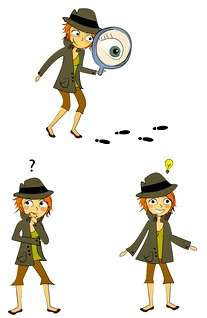Be a Word Detective
Practice your word detective skills! Look through these useful words connected with detective work. Read the explanations, then put them in the correct categories (in your head, or on a piece of paper. Answers are at the bottom of the page.)
Then fill in the blanks to complete the detective story. (Until the tech can be fixed, answers to the gap-fill are also at the bottom of the page.)
Word Detective Verbs

analyze, conclude, deduce, detect, examine, infer, inquire, inspect, investigate, observe
To inquire is to ask; to detect is to discover something or recognize something new about it. Of the other verbs:
1. Which 4 are ‘thinking verbs?’
2. Which 4 are verbs of observation? (all synonyms)
Put these related words into their correct categories:
analysis, analyst, analytic or analytical, conclusion, conclusive, deduction, detection, detective, examination, inference, inquiring, inquiry, inquisitive, inspection, inspector, investigation, investigative, investigator, observant, observation, observer
Note: inquiry can also be spelled enquiry
Categories:
3. People who do these things:
4. The names (nouns) for what they do:
5. Related adjectives that describe these activities or people:
Fill in the blanks below with these words:
deductions, detectives, (or Detectives), evidence, investigate, investigating, process.
(You will need to use most of them more than once. Pay attention to singular and plural, and to the parts of speech. They will help you figure out which word can go in each blank.)
(The reading in issue #2 of The English Detective shows how the scientific method can resolve a mystery. (It’s about the discovery of antibiotics).
To learn a little about Sherlock Holmes and practice these (& some related) words more, see Sherlock Holmes and the Vocabulary of Detection. Its vocabulary is a little difficult-- good if you can read English at an intermediate to advanced level. For simpler vocabulary practice, see The Real Sherlock Holmes. (It tells about the doctor that Sherlock was based on.)
Answers
1. Thinking verbs:
analyze, conclude, deduce, and infer
2. Verbs of observation:
examine, inspect, investigate, and observe
3. Nouns involving detection & crime: people
analyst, detective, inspector, investigator, observer (as well as others not on the list above)
4. Nouns involving detection & crime: actions & ideas
analysis, conclusion, deduction, detection, examination, inference, inquiry, inspection, investigation, observation
5. Related Adjectives
analytic, analytical, conclusive, inquiring, inquisitive, investigative, observant
Gap-fill Paragraph 1: detectives; evidence
Paragraph 2: Detectives; evidence; process; deductions; evidence; investigate; deductions
Paragraph 3: process; investigating; detectives; deductions; investigate; evidence
This exercise is also available for classroom use as an inexpensive pdf, along with other useful vocabulary and reading skills practice, in Vocabulary Worksheets.
Home> How to Learn Professional Vocabulary >Be a Word Detective.
Didn't find what you
needed? Explain what you want in the search box below.
(For example, cognates, past tense practice, or 'get along with.') Click to see the related pages on EnglishHints.
| site search by freefind | advanced |





